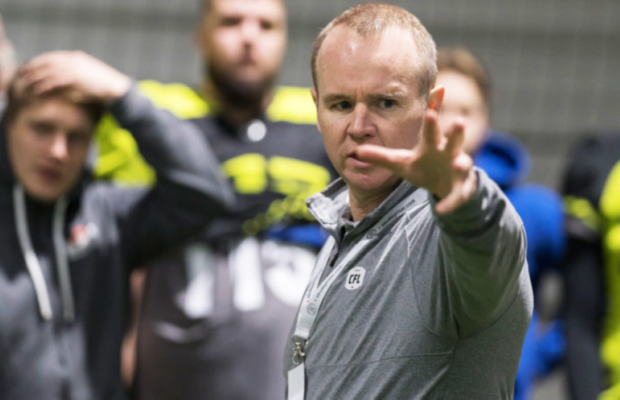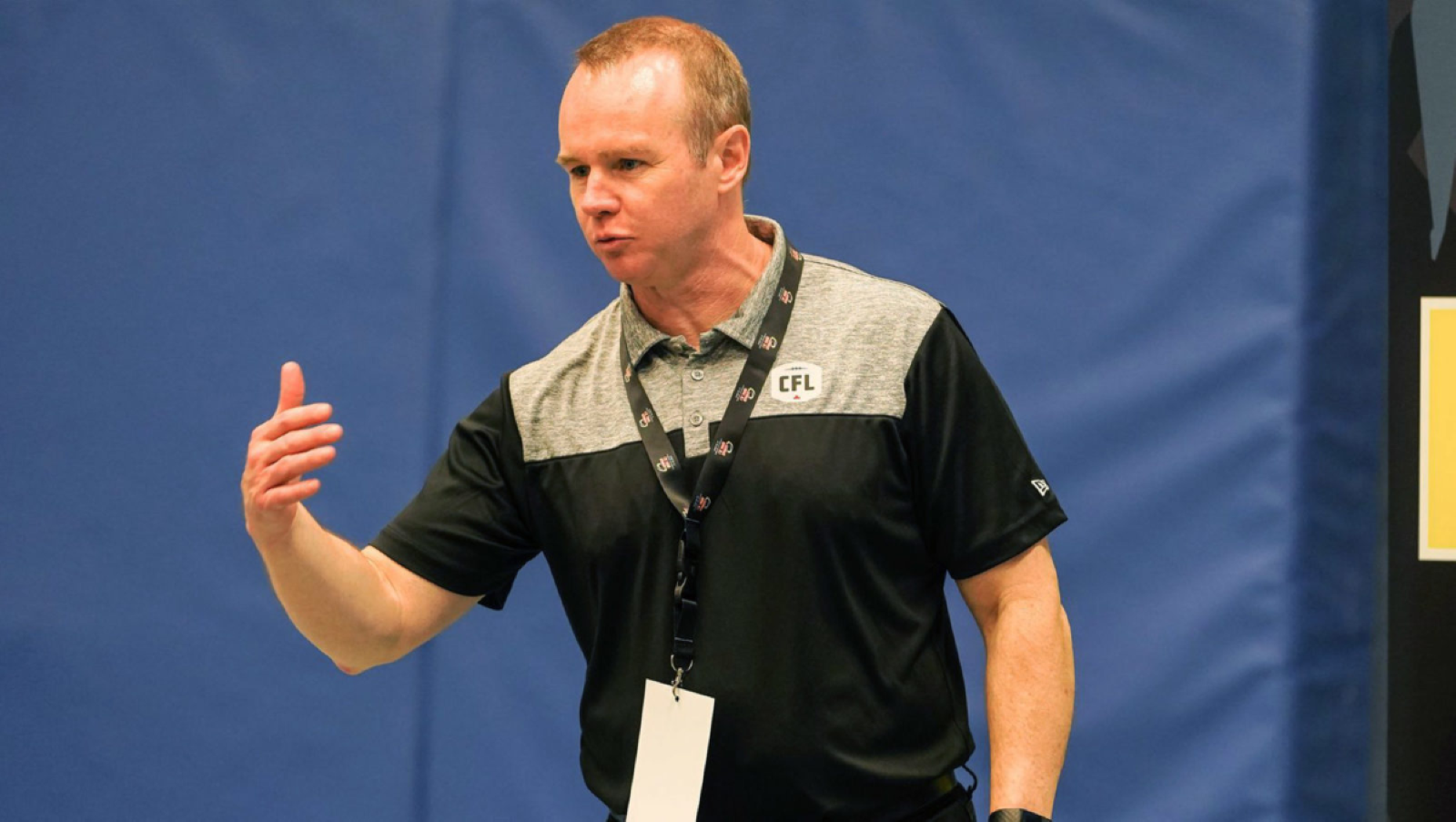CFL CFO and Head of Football Operations Greg Dick: ‘Grey Cup won’t be on Christmas Day’

By Chris O’Leary, Senior Writer, @olearychris
Greg Dick is the CFL’s Chief Financial Officer and the Head of Football Operations. He’s been central to the myriad of conversations that have taken place over the last two-plus months as the CFL and the sports world in general tries to find a way through the pandemic. From a nearly 40-minute conversation with the Waggle show hosts Donnovan Bennett and Davis Sanchez last week, here are some of the most pertinent issues that were discussed.
HUB CITIES AND THE WIN-AND-HOST MODEL
“If we do a hub city (the win-and-host) model may not matter,” Dick said, providing some clarity on what are two separate models that the league is looking at for 2020.
A hub city would entail multiple or all teams congregating in one host city. Players, coaches and staffs would isolate and within their own bubble of sorts, would carry out a season in that central location.
“We’re looking at a number of scenarios because we don’t know what’s going to happen. If we can have a season where teams play in their own stadium with or without fans — obviously with fans is our first choice — then that win-and-host makes sense. But in a hub scenario we’ll be in the hub, we’ll be in the bubble and that’s another scenario that we’d have that we’re looking at.”
IS A SEASON FINANCIALLY VIABLE WITHOUT FANS?
“We’re trying to model this right now.
“There’s been lots of talk about if you can social distance in a stadium with a certain number of fans. It’s very complicated because of the health regulations you have to talk about. That’s a very complicated scenario that we’re looking at.
“We broadcast games, we certainly would get some revenue from our broadcast deal with TSN, from sponsors. How much, we’re still trying to figure out. That and the logistics of a hub city, we’re working through those and it’s complicated.
“There have been lots of stories about the other leagues trying to do this. It’s complicated because of how you have to keep people in the bubble and the testing and the monitoring of the players and everyone at the stadium, everyone at practice you’d have to (test). The financial viability of those scenarios, we’re still trying to figure out.
“It changes every week because of different things that the health organizations and governments give us because as time goes on, how often do you have to test people? How many people can be together? What’s the social distancing? Things like that. I don’t have a good answer for that question because it’s so complicated. We’re looking at all of the options but we don’t know yet what’s…like Randy (Ambrosie) said, we’re looking at the safety and financial viability of these scenarios.”
IS THERE A DROP DEAD DATE ON THE SEASON?
There’s a good news/bad news answer here. The good news is that there isn’t a concrete pull-the-plug date on the season. The bad news is that it would have to come at some point in August.
“If we want to start in September and we want to have a Grey Cup in early December or mid-December, we’re probably we’ve got a few dates. Things are fluid, but it’s going to be in August at some time,” Dick said.
“You have to activate with enough time and you have to work with the (CFL Players’ Association) too, to give the players enough notice and enough time. It’s probably in August. You have to activate in August, where you have to make the decision to go so you can have a training camp.
“Don’t forget right now at this point in the year we would have (with) anyone crossing the border or going to another province, they have to self-isolate for 14 days. When you start to do the work-back schedule of when you’d start training camp and when you have to self-isolate in the location that they have to go to, that’s why August is likely the month.”
WHAT ABOUT PLAYERS ACCESSING FACILITIES?
In early May, the Ontario provincial government allowed pro sports teams to open their facilities for individual workouts. It’s something that the league is sorting through.
“We’ve talked about it. We’re still in the preliminary stages of putting our phase 1 return to facility plan together and the challenge,” Dick said, “is that there aren’t a ton of guys in-market right now.
“What I foresee happening when we do do this — and I think it could be in the next month and I’m guessing we have to get these plans approved — you have to go by the provincial requirements, then the municipality has to have its requirements too.
“This is for sports and other facilities too…when we do get there guys will then be able to go back and get therapy at the stadium under the restrictions (of) social distancing and cleanliness and everything else. I could see them being able to go and potentially lift weights in their facilities.”
Dick sees the challenge coming in the idea of players running drills together.
“I don’t know if we’re a month from that,” he said.
“I think on an individual basis, what MLS has done is players are allowed to go back but they have to train by themselves at their facility and they have strict restrictions on when and how and (teams are) testing them, checking their temperature, things like that. They have to be totally by themselves. That’s the challenge with football. You can do your training by yourself but throwing the ball, doing some other drills with a group of guys is not as close as we might hope.
“It’s going to come, but we’re not quite there. Another issue we have is not all of the provinces are on the same level in terms of having facilities open, so we may wait until everyone’s ready at the same time to do it across the league.”
Dick said that the CFL is monitoring how other leagues around the world are navigating this. That includes Bundesliga in Germany, which is now two weeks into its resumption of league play.
GRASSROOTS FOOTBALL PERSEVERING THROUGH CHALLENGES
In contact with football provincial bodies across the country, Dick said that he’s optimistic about the future of the game, in spite of what promises to be a challenging year for kids that are playing football this year.
“The thing I’m happy about from a grassroots perspective…provincial sports bodies are strong and have good plans to get back,” he said.
“They’ll start with simple stuff of doing combines and drills. Skills and drills, limiting kids and keeping them involved, keeping coaches involved. I was happy to hear that. My concern was how are they going to survive? Thankfully we have strong leadership at the grassroots levels across the country. It’s not going to die and I’m happy to have heard what’s going on across the country. Everyone’s optimistic that once we get back to normal we’ll push play on the plans we had to grow the game. I think we’ll survive. It’ll be a pause in the growth, but it’ll be fine.”
U SPORTS football will be challenged this year, as each conference tries to figure out just how impacted their programs will be this year. As campuses across the country react to the pandemic differently, with some anticipating students being on campus in the fall and others planning for closed campuses and online instruction, that places question marks over how athletics will be affected.
“The thing I’ll say about the university coaching network is I know they’re resilent and I don’t think they’ll let football die. It’ll be disappointment if they can’t play a season. I think the…ability to continue to train but not play will keep the flame alive, keep the flame going and you just start to plan for next year.”
Dick also mentioned that he’d heard a rumour about the possibility of a spring league, which would buy U SPORTS some time in the academic school year, if they did lose a fall season. That would also help players that are CFL draft-eligible to get some exposure and for teams to evaluate them ahead of the 2021 CFL Draft.
TIDBITS
On the idea of the Grey Cup being played in December, Dick said that the league’s planning didn’t envision it going past the middle of the month.
“We want to stay away from just before the Christmas holidays. We have a little bit of flexibility there, but (the game) won’t be on Christmas Day or around Christmas, for instance,” he said.
While the 2020 season would be a reduced number of games, there is a limit to how low the league could go. Dick said that there would have to be “around half a season at the minimum,” for the year to have a feeling of legitimacy and to avoid the Grey Cup winner having an asterisk next to their name. So down from 18 games, a best-case scenario would be eight to 10 games on a revised schedule.
“We’ve got various scenarios. With nine teams you have to do it by twos and scenarios around an even number of games,” he said. “Half is the minimum we’ve talked about. All the scenarios are on the table but around half. I don’t think we’d go too far less than half for a legitimate season.”
